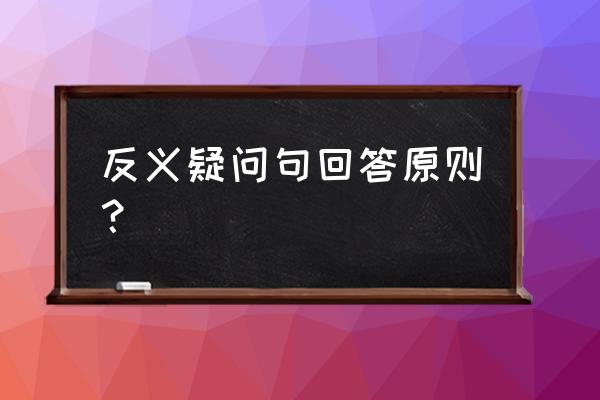反义疑问句回答规则

反义疑问句回答原则?
反义疑问句回答原则?
回答反义疑问句要记住“实事求是”。因为对于肯定或者否定的英语回答只有两种可能:Yes或No,所以无论问句如何提问,事实不变。
She can play football, can#39t she?
Yes, she can.是的,她会。
No,she can#39t. 不,她不会。
注意:
对于“You don#39t love me, do you?”这个问题的回答只有两种:
Yes, I do.不,我喜欢你。
No, I don#39t.是的,我不喜欢你。
反义疑问句规则?
反义疑问句由两部分构成,前面是个陈述句,后面是个简短问句。前后时态一致,简短问句要用人称代词。总得规则#34前肯后否,前否后肯#34,如果前边有否定意义的副词,后面用肯定形式。例如:
You are a student, aren#39t you?
The twins don#39t know the answer, do they?
He has never heard of that, has he?
反义疑问句规则?
反义疑问句是由一个普通的陈述句加上一个省略的附加疑问句组成。
如果陈述部分是肯定的,附加疑问句就用否定;如果陈述部分是否定的,附加疑问部分就用肯定。
You do not get the main idea of this article, do you?
英语反义疑问句的特殊情况:
(1) 当陈述部分主语是#34this#34或者#34that#34时,附加疑问部分的主语通常用#34it#34;当陈述部分主语是#34these#34或者#34those#34时,附加疑问部分的主语通常用#34they#34。
This is a boat, isn#39t it?
(2) 当陈述部分主语是#34nobody#34#34no one#34#34somebody#34#34someone#34等不定代词时,附加疑问部分的主语通常用#34they(强调全体)#34或者#34he(强调个体)#34;当陈述部分的主语是#34something#34#34nothing#34#34everything#34等不定代词时,附加疑问部分的主语通常用#34it#34。
Someone is waiting for you in the garden, isn#39t he?
No one knows where he comes from, do they?
Everything seems different today, doesn#39t it?
(3) 当陈述部分主语是非谓语动词或名词性从句时,附加疑问部分的主语通常用#34it#34。
Taking care of our environment is of great significance, isn#39t it?
To protect the security of personal property is our unshirkable responsibility, isn#39t it?
What we saw was not what really happened, was it?
(4) 陈述部分是以#34there be#34开头的句子,附加疑问部分仍然用#34there#34。
There is a bird in the tree, isn#39t there?
(5) 当陈述部分是I#39m结构的句子是,附加疑问部分用#34aren#39t I#34。
I#39m late, aren#39t I?
(6) 在祈使句中通常情况下都是用#34will you#34,但是在#34Let#39s#34开头的祈使句中,附加疑问部分要用#34shall we#34,而#34Let us#34开头的祈使句中,疑问部分也是用#34will you#34。
Pass me the salt, will you?
Let#39s go for an outing, shall we?
(7) 当陈述句中的谓语动词是#34must 动词原形#34时,根据must在句中的意义可分为三种情况。
You must be Tom, aren#39t you?
You mustn#39t sit here, will/may you?
You must go now, needn#39t you?
(8) 当陈述部分为主从复合句,主句的谓语动词是#34believe#34 #34suppose#34 #34expect#34 #34think#34等,且主语是#34I#34或者#34we#34时,附加疑问部分的人称,时态以及否定关系应该与宾语从句保持一致(此时一定要注意否定转移情况)。
I believe that he can get good mark in this monthly examination, can#39t he?
I don#39t think that they are excellent, are they?
(9) 当陈述部分出现否定词或者具有否定意义的词,如:little, hardly, seldom, never, no, not, neither等时,附加疑问部分要用肯定。
You never focus your mind on your job, do you?
He could hardly understand what you said, could he?